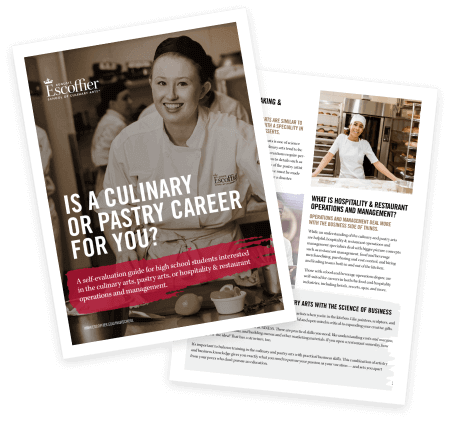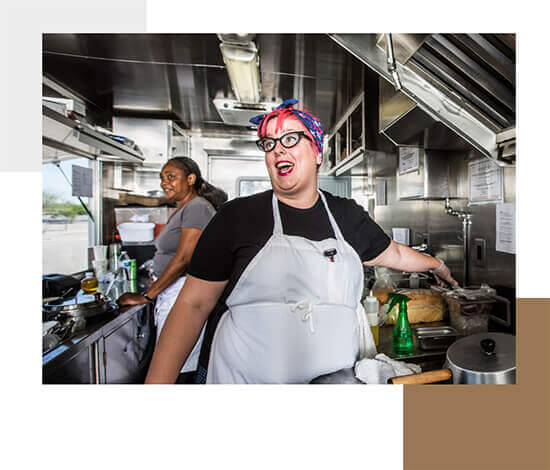DIPLOMA AND DEGREE PROGRAM COURSES
Culinary Foundations I
This course begins with food safety and sanitation in the professional kitchen, including proper hygiene, food handling, food storage, cleaning, pest control, in a food service operation. Students become acquainted with tools, utensils, and equipment in professional food service and discuss kitchen layout. Fundamental knife skills, cutting techniques, and the concept of mise en place are covered. Production of stocks, soups are included along with an introduction to grain and legume cookery. And introduction to the role of heat in various cooking techniques rounds out a foundational knowledge in culinary arts.
Foodservice Management
This course covers the different types of commercial food service operations, and how to manage each using the principles of good service. Students may study the hierarchy of management in food service, and the skill needed to succeed as a manager: training employees, motivating them, disciplining them, and creating a safe and positive work environment. The course also explores how to act responsibly and make decisions that benefit the company.
Culinary Foundations II
This course offers a deeper level continuation of understanding of foundational culinary skills. Students will be introduced to various dry-heat, moist-heat and combination-heat cooking techniques, as well as understand the role of the five Mother Sauces in cuisine. A greater emphasis on knife cuts and accuracy is focused upon, and plating and presentation are introduced to give students the basic skills necessary to advance in a culinary arts education.
Food Styling and Photography
Students have the opportunity to learn professional food photography techniques using the camera that is always close by - their smartphone! Beginning with an introduction to photography, the course explores how food styling and food photography props, lighting, and overall composition can make your food come alive in social media.
Dough and Leaveners
This course covers ingredient function, leavening agents and mixing methods related to doughs with an emphasis on understanding bakeshop techniques to produce savory results. Production of quick-doughs and batters, flatbreads, yeast-raised-doughs, various formations and related accompaniments.
Social Media Content Development
Students have the opportunity to explore the world of content creation as part of the overall promotional strategy. The course focuses on creating content goals, understanding relevant social media platforms, and target audiences. Students then create a publishing schedule and discuss amendments to the schedule and social media content calendar based on performance analytics.
Purchasing and Cost Control
Three out of five foodservice operations fail within five years of opening, often due to money mismanagement; this course can give students the skills to not only keep their restaurant in business but also turn a profit. This course introduces students to purchasing, receiving, inventory management and menu pricing. Students can learn how to minimize costs and maintain a full range of customer services. The course progresses from the fundamentals of culinary math into an overview of storeroom operations, inventory, portion control, as purchased and edible portions, ingredient conversions, and recipe costing.
Western European Cuisines
Students have the opportunity to gain an understanding of Western European cuisines by exploring history, traditional and indigenous ingredients, flavor components and cooking techniques. Application of classical and contemporary cooking techniques, plate design, and application of proper sanitation techniques.
Menu Design and Management
This course explores creation and application of various types of food and beverage menus. The course covers all aspects of menu planning and design, ranging from visual design to price analysis to making use of available resources. The menu is both a financial tool and a communication tool, and students learn about its uses as both.
Food Blogging and Recipe Development
This course gives students an introduction to creating a food blog to serve a niche market and discusses methods to enhance the success of the blog through sharing recipes specific to the business. The course focuses on keywords, search engine optimization, revenue generation, and creating blog posts to combine the techniques covered in class.
American Regional Cuisine
Students have the opportunity to gain an understanding of American Regional cuisine by exploring history, traditional and indigenous ingredients, flavor components and cooking techniques. Application of classical and contemporary cooking techniques, plate design, and proper sanitation techniques.
Hospitality Marketing
This course identifies marketing orientation as a management philosophy that guides the design and delivery of guest services in the organization. It explores marketing themes unique to hospitality businesses along with established general marketing principles. Helps students become better at understanding, predicting, and influencing consumer behavior through theoretical knowledge and applied strategies.
Culinary Entrepreneurship
This course is a culmination course in entrepreneurship. It covers such topics as business planning, pricing, credit management, government regulation, and legal concerns. Business ethics and the crucial role and importance of management and leadership are also covered. Explore how to write a business plan for your food truck or restaurant.
Externship I
This course provides opportunities for real life experiences in an operational restaurant or related business and builds on the skills and techniques covered in previous courses. In the course, students have the opportunity to apply the skills they have learned in practical ways to real-world situations. Students can gain hands-on experience in a kitchen that mirrors their future work in the industry while developing necessary career skills. Immersion in a work environment also allows students to develop industry contacts and build working relationships. Externship courses are specific to the area of program concentration and must be completed for each concentration in which a student is enrolled. Externship must be completed for each new program enrollment.
DEGREE PROGRAM - ADDITIONAL COURSES
World History and Culture from the Culinary Perspective
Throughout history, food has done more than just provide nourishment. From prehistoric times to the present day, food and the pursuit of it has had a transformative role in human history. Food has impacted societal organization, industrial development, military conflict, and economic expansion. As epicure and gastronome, Jean-Anthelme Brillat-Savarin stated, “Gastronomy governs the whole of human man.” In addition, food also serves a role in the cultural development of religion, economics, and politics. This course examines the role of food and its contribution and influence over history, culture, religion, economics, and politics. Food customs and attitudes are also explored, as well as the social awareness of selected food patterns and customs.
Technical Writing for the Hospitality Industry
Technical Writing for the Hospitality Industry prepares students to write in the hospitality and food service professions. In a professional setting, writing provides readers information they need in a format they can understand. Unlike most academic writing, in which students demonstrate their learning to a professor who already knows the subject, in technical communication the writer is the expert, and the readers are the learners. In the hospitality and foodservice profession, students and professionals write a variety of documents for supervisors, colleagues, and customers such as explaining a problem or product, preparing a proposal, or illustrating a project. This course teaches students to adapt their writing to different audiences and purposes. This course outlines strategies for making subjects clear to readers who need to understand them. To communicate effectively with an audience, writing must meet rigorous editing standards, in addition to writing in a clear, concise style and presenting information logically.
The Science of Nutrition
In the Science of Nutrition course, the basic principles of nutrition are investigated. Emphasis is placed on the nutrients, food sources, and their utilization in the body for growth and health throughout life. Contemporary and global nutritional issues are also discussed.
Business and Professional Communications
The Business & Professional Communications course emphasizes the principles and practical application of effective communication behaviors within professional, business, and organizational contexts. In addition to identifying the importance of effective communication skills to the hospitality industry, communication styles and effective listening methods may be addressed. Students may create and produce oral presentations including cooking demonstrations and special occasion speeches. Listening skills, verbal and nonverbal communication, conflict resolution, cultural differences in communication, and debate techniques are also examined.
Foodservice Math and Accounting
Foodservice Math & Accounting introduces students to managerial accounting concepts and explains their applications to specific operations within the hospitality industry. Emphasis is placed on how to administer accounting procedures to minimize costs and maintain a full range of customer services. After a summary of the fundamentals of culinary math, an overview of basic business accounting transactions is covered including asset/liability accounts such as accounts receivable and payable, ledgers, balance sheets, payroll and financial statements.
Externship II
This course provides opportunities for real life experiences in an operational restaurant or related business and builds on the skills and techniques covered in previous courses. In the course, students apply the skills they have learned in practical ways to real-world situations. Students gain hands-on experience in a kitchen that mirrors their future work in the industry while developing necessary career skills. Immersion in a work environment also allows students to develop industry contacts and build working relationships. Externship courses are specific to the area of program concentration and must be completed for each concentration in which a student is enrolled. Externship must be completed for each new program enrollment.













